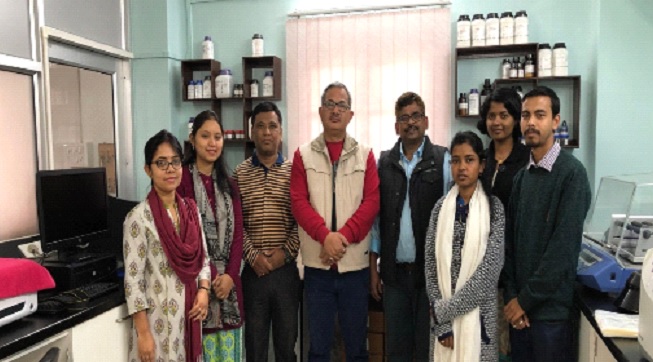*****3votes
TANMOY KARAK | Principal Scientist (Soils)
TEA RESEARCH ASSOCIATION
Upper Assam Advisory Centre
Dikom-786101, Dibrugarh, Assam, India
Email: tanmay.karak@gmail.com ; t.karak@tocklai.net
Web: www.tocklai.org
Born and brought up in a small village named Kharika, in Midnapore district (W) of West Bengal, Dr. Tanmoy Karakhas been serving as a Principal Scientist (Soils) since 2015 at Upper Assam Advisory Centre, Tea Research Association, Dikom, Dibrugarh in Assam, India. Prior to that, he served as a post-doctoral fellow at China Agricultural University, Beijing, P. R. China (2003-05), Chemist at Pollution Control Board, Assam (2006-2008) and Senior Scientist at Tocklai Tea Research Institute (the oldest and the largest Tea research institute in the world; www.tocklai.org) (2009-2014). He completed his Ph.D. in Agricultural Chemistry and Soil Science from Bidhan Chandra Krishi Viswavidyalaya, West Bengal, India (2003); M.Sc. in Agricultural Chemistry & Soil Science, Calcutta University, West Bengal, India (1998) and B.Sc., Chemistry Honours, Calcutta University, West Bengal, India (1996). Over the past decade, he visited several countries in Asia, America, Africa and Europe in connection with his collaborative research programmes. He has received the following professional honors, awards and fellowships during his research career:
-
DBT Overseas Associateship, Government of India (two times)
-
Recipient of DBT-UExcel grant
-
National Research Foundation (NRF) Postdoctoral Fellowship from South Africa (not availed)
-
Changjiang Postdoctoral Fellowship in China Agricultural University (IRT0412), Sino-Israeli Agricultural Research Funds, P. R. China
-
Postdoctoral Fellowship at the Department of Soil & Water Sciences, College of Resources and Environmental Sciences, China Agricultural University, P. R. China
He is also an Associate Editor of the International Journal of Environmental Science and Technology, Springer (2017 Impact Factor: 2.037).
Current research
Dr. Karak’s main research field is Agricultural Chemistry and Soil Science. His long term research interests focus on understanding the behaviour of trace elements/micronutrients at the agricultural soil-water interface as well as issue of soil health, as it is impacted by the contamination of soils by prolonged and non-judicious application of fertilizers and manures.
The focus of his research at present is the bioavailability of toxic and trace metals in tea growing soils to tea (Camellia sinensis L.) plant. Among the beverages, tea is a widely consumed popular medicinal, aromatic, non-alcoholic, comparatively less expensive, healthy and stimulating beverage. Over two-thirds of the world’s population drink tea and about 18 to 20 billion cups of tea are consumed daily in the world as it promises a lower risk of several diseases. At present, tea grows in more than 45 countries, spreading within the latitudinal range of 45º N to 34º S, covering a total area of about 3.94 million hectares globally. Total tea-cultivated area in India is 0.58 million hectares, which accounts for 14.72% of total tea-cultivated land in the world. The state of Assam, extending from 89º42′ to 96º E longitude and 24º8′ to 28º2′ N latitude, is blessed with favorable soils and climatic conditions for tea cultivation. This is also reflected by the state’s major share of tea-cultivated land covering an area of 0.32 million hectares in India. Assam alone produces more than 50% of the tea produced in India, i.e., 487.5 million kg per year, which accounts for about 14% of the world’s total tea output. His recent study has demonstrated that the presence of micronutrients in tea is due to tea plants being normally grown in highly acidic soils, where micronutrients are potentially more bioavailable for root uptake. From his research results, it was concluded that cosumption of three cups of tea infusion per day does not have any adverse effect on human health with respect to micronutrients rather it has benifical effects on human health.
Very recently, his research group has established “Tea Research Association Heavy Metal Contamination Index (TRAHMCI)” to negate discrepancies among the existing metal contamination indices. TRAHMCI has been formulated based on individual contamination factor using statistical technique and provided a more holistic understanding of overall tea growing soil behaviour with respect to selected metals (Cd, Cr, Cu, Mn, Ni and Zn). This index has been accepted at national/international level and is reportedly being used by other researchers across the globe successfully.
Tea plant is also a hyper accumulator plant for aluminium (Al) as compared to other trace elements in soil. Aluminium is toxic for plant roots and it affects the plant growth by hampering its root mineral uptake. However, tea plant has the ability to detoxify Al, which is not possible in most of the other plants. His research group has been investigating the mechanism of Al detoxification in tea plant influenced by inorganic and organic amendments. DBT sanctioned a project under the Unit of Excellence (U-EXCEL) scheme for this research work which has greatly strengthened the research programmes of his team.
Another field of his research includes the cost effective production of biochar (BC) and its value addition for sustainable tea cultivation. The objective of this research is to quantify the impact of BC compound fertilizer on the nutrient retention, changes in the microbial community and growth of tea plant. Outcome of this continuing research will be the cost effective BC compound fertilizers that will help retaining the nutrients for longer time to check nutrient leaching and in turn enhance the growth of the tea plant to provide financial gain to the tea industry.





